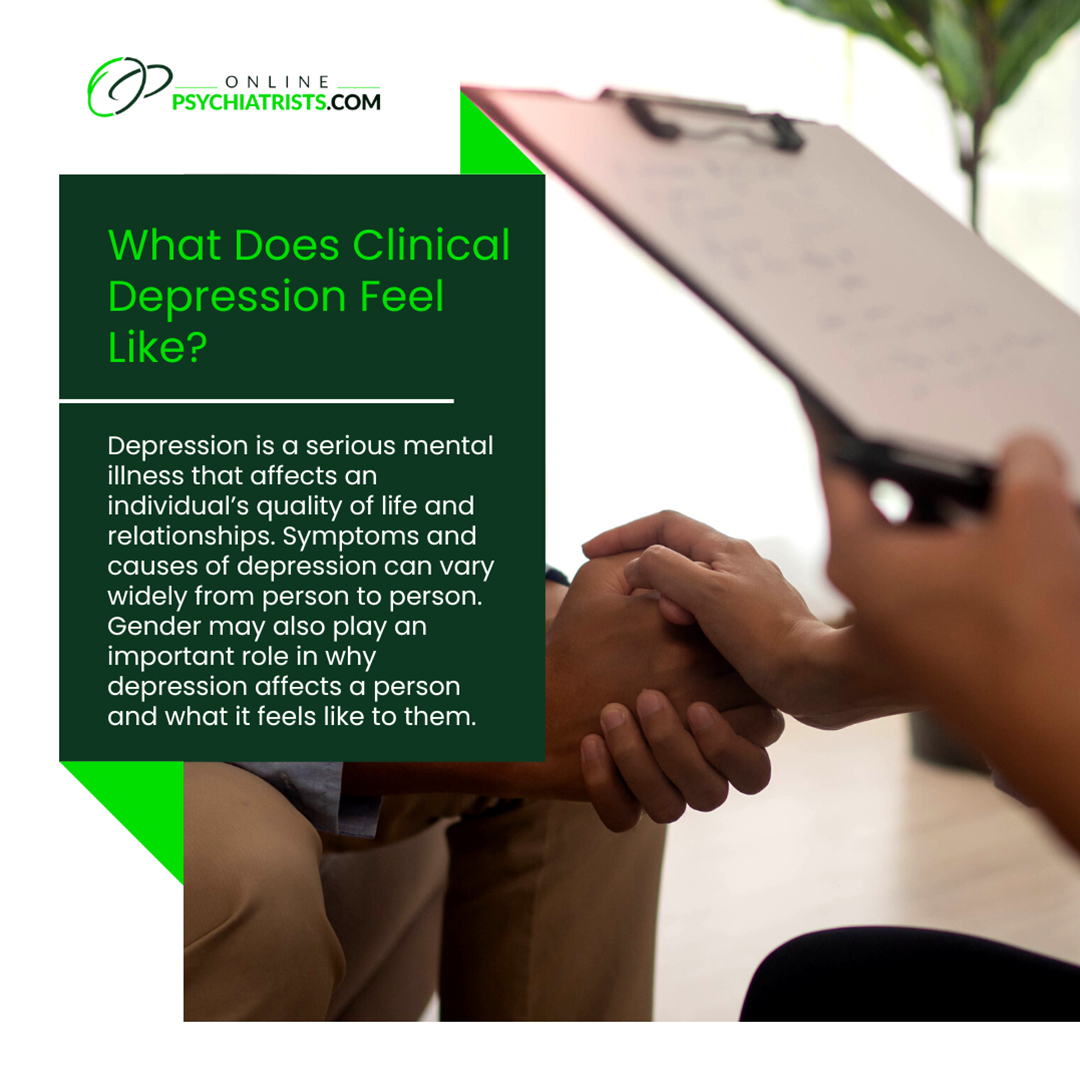

If you are having trouble handling your personal or work responsibilities and losing interest in performing even simple life activities, you may be suffering from depression. Feelings of sadness, irritability, despair, self-doubt, loss of any pleasure, and a distorted and negative sense of self can disrupt your life and negatively impact your health and wellness. Schedule an appointment with Dr. Zlatin Ivanov to prevent and manage debilitating symptoms and manage things better. Dr. Ivanov has years of experience in treating depression and offers the most effective treatment plans and therapies that help you fight feelings of despair successfully.
Depression is a serious mental illness that affects an individual’s quality of life and relationships. Symptoms and causes of depression can vary widely from person to person. Gender may also play an important role in why depression affects a person and what it feels like to them.
If you think you or a loved one is dealing with depression, take it seriously and seek medical assistance without wasting time.
Also called a major depressive disorder or clinical depression, it is a common but serious mood condition that causes severe symptoms affecting how you think, feel, and handle daily activities, such as eating, sleeping, or working.
While for some people, symptoms of depression build over time, for others, they begin suddenly. Any incident or event, such as a tragic family experience, can lead to a depressive episode.
Some people may experience a few signs, and others may feel many symptoms. Potential symptoms include:
When it comes to depression, no two people have the same feelings or experiences. While some may feel like walking through sludge, for others, it is being trapped inside a deep, dark hole or a tiny box.
Many people mistakenly believe that being depressed is a choice or they need to have a positive attitude. Friends and loved ones often get frustrated or fail to understand why an individual cannot snap out of whatever is affecting them and even say they have nothing to be depressed about.

Depression is a really serious thing. Even everyday tasks like getting out of the bed, taking a shower, doing laundry, and taking medication can seem too much. Learning what it can look like and understanding how it can create everyday challenges for people experiencing it can be a crucial step for helping them seek appropriate treatment when they need it.
For someone who has never experienced depression before, it can be hard to imagine how overwhelming this condition can be. The symptoms can affect every aspect of an individual’s life and impact physical health, daily routines as well as relationships with family and friends. Most people suffering from depression agree that life would be easier if others could understand what they are going through and show compassion.
Read more: What Are The Signs Of A Nervous Breakdown?
If you notice that you or a loved one have been experiencing symptoms of depression for more than two weeks, it may be time to seek professional help. You can begin by reaching out to your healthcare provider or a mental health professional who will guide you more about this condition and make an accurate diagnosis.
They will ask a series of questions and work to understand relevant medical history. They may even ask you to complete a questionnaire and provide family history, and perform an exam or order lab tests to check if you have another medical condition.
Symptoms of depression can be challenging, but the good thing is that clinical depression, even severe depression is treatable. Psychotherapy and medications are the most commonly used treatments for depressive disorders. Mental healthcare experts believe psychotherapy is generally the first-line treatment for mild to moderate depression.
For moderate to severe depression, a combination of medications and psychotherapy is recommended. Many patients with depression report that trying four or more depression medications helped them with their depressive symptoms.
It is essential to know that an individual’s genes may impact how they respond to or break down certain depression medications. A healthcare provider can request a test to check the effect of genes on depression medications. This test would include medications that may require dose adjustment, are less likely to work, or have an increased risk of side effects based on the genetic makeup.
Depression can feel very dark, and for people who are severely depressed, suicide is a real threat. In extreme cases, people with depression may even have thoughts of suicide or harming themselves. It is important to note that suicidal depression is not a clinical diagnosis, but a condition you may notice.
It has been referred to as depression with suicidal thoughts by most mental health professionals. It means when someone has clinical depression with suicidal thoughts as a symptom, they are experiencing suicidal thoughts as a part of their overall health symptoms.
If you are supporting a friend or family member with depression who is showing warning signs of suicide, get immediate help.
Potential signs include:
Remember, suicidal behavior is impulsive. Removing any weapons, medications, or other means that could cause harm can earn enough valuable time for you to overcome a suicidal impulse and consider other ways to cope with your pain.
Read more: How To Get Prescribed Adderall For ADHD Online
Depression is a real mental illness, and people experiencing it cannot simply decide to stop feeling depressed. It can feel all-consuming and hopeless, which increases the need for professional care.
If you are experiencing symptoms of depression, you must seek assistance from a trusted psychiatrist. If left untreated, depression can worsen and affect your quality of life.
A mental health professional will discuss treatment options to help manage your depression and carry on with your routine life. In severe cases, depression can lead to thoughts of physically harming oneself or suicidal thoughts. Any thoughts or statements about not wanting to live should not be taken lightly.
It is never too late to get help if you are dealing with depression that is disrupting your life, as treatment can make you feel better and regain control of your life. Call psychiatry practice today for expert advice on handling your symptoms and to get back to feeling more like yourself again. Dr. Zlatin Ivanov understands how depressive symptoms can affect your mental and physical health and comes up with the best treatment plans to address the problems you are facing. The various forms of treatments including therapy, medication, and lifestyle activities, can reduce negative thinking, feelings of sadness, guilt loneliness, anxiety, and most importantly, shift your thinking and behavior.

Dr. Zlatin Ivanov, MD, is an adult psychiatrist specializing in addiction treatment, ADHD, anxiety, depression, and OCD. He offers exceptional talk therapy and medication management through online video conferencing.
Dr. Ivanov is double board certified in Psychiatry and Clinical Neurology and a member of the American Psychiatric Association. His medical career is colored by many outstanding contributions to medicine, including several publications, research, and scientific presentations. An attending psychiatrist at Woodhull Medical Center in Brooklyn, NY, and Bellevue Hospital Center in New York City, he takes the time to listen to patients and makes sure they know he is committed to their unique situation.
 Our Locations
Our Locations
The Chrysler Building
405 Lexington Ave, #2601
New York, NY, 10174 (map)
300 Carnegie Center Drive #150K,
Princeton, NJ, 08540 (map)
701 Brickell Avenue, 1550#A,
Miami, FL, 33131 (map)